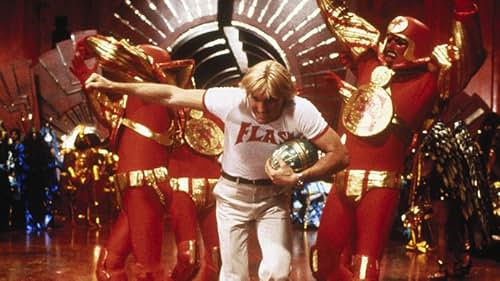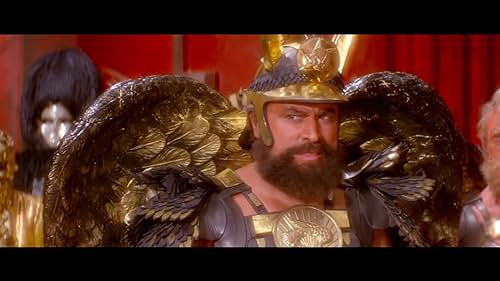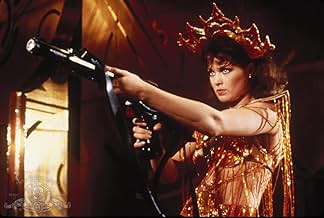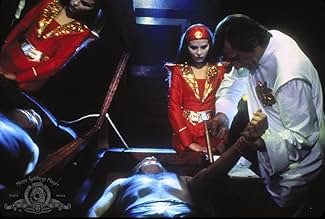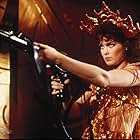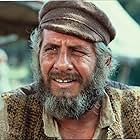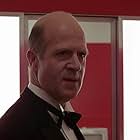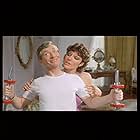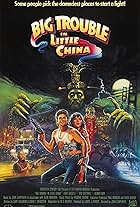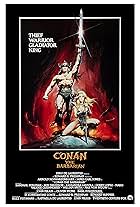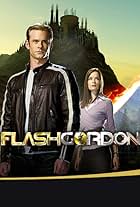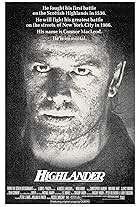A football player and his friends travel to the planet Mongo and find themselves fighting the tyranny of Ming the Merciless to save Earth.A football player and his friends travel to the planet Mongo and find themselves fighting the tyranny of Ming the Merciless to save Earth.A football player and his friends travel to the planet Mongo and find themselves fighting the tyranny of Ming the Merciless to save Earth.
- Nominated for 3 BAFTA Awards
- 2 wins & 14 nominations total
Max von Sydow
- The Emperor Ming
- (as Max Von Sydow)
- Director
- Writers
- All cast & crew
- Production, box office & more at IMDbPro
Storyline
Did you know
- TriviaFlash jumping towards the camera screaming "YEAH!" was improvised by Sam J. Jones. Nobody could figure out how to end the movie.
- GoofsAt the very beginning of the film, Ming and his henchman are discussing "an obscure body in the SK system", which the inhabitants refer to as the planet "Earth", pronounced as if the word is completely foreign to them. However, at that moment, Ming activates a button on his console labeled "Earth Quake".
- Quotes
Dale Arden: Ming's not unbeatable. With all his men, he couldn't even kill Flash.
Prince Vultan: [incredulous] Gordon's alive?
- Crazy creditsWhen the ending title appears, a hand picks up Ming's ring and Ming is heard laughing. A "?" appears, making it "THE END?"
- Alternate versionsThe Wide Screen VHS version released by BMG contains all the cut scenes in their complete and uncut version.
- ConnectionsFeatured in Queen: Flash (1980)
Featured review
Colorful, silly fun, at times campy, Mike Hodges's 1980 "Flash Gordon" is among those movies that are less than the sum of their parts. Made on shoe-string budgets with C-picture performers and crew for young undemanding viewers, the original 1930's Flash Gordon serials are unintentionally funny to adults today. To recapture the innocence and naivete of those movies with a big budget and trained actors is a difficult task, although Hodges's "Flash Gordon" makes a decent attempt. Lorenzo Semple's screenplay tracks the original serials fairly well; Flash and Dale Arden are taken aboard Doctor Hans Zarkov's spacecraft and flown to the planet Mongo, where they battle Emperor Ming the Merciless to save the Earth. Semple's script has enough classic bad dialog to satisfy seekers of camp; "I love you Flash, but we only have 14 hours to save the Earth." However, the difference between Semple's script and the original series is that Semple knew he was writing bad dialog, while the writers of the serial were unintentionally hilarious.
That difference in intention also applies to the actors; Buster Crabbe and company played the serials dead-pan straight, and those in the remake who play their parts equally straight come off best. The under-demanding role of Flash requires the skills of a Razzie Award Winning thespian, and, Sam J. Jones won a Razzie nomination for his work herein. Although not a super hero in the modern sense, the blonde hunk, who sports nothing but leather trunks in one scene, physically fills the role, and Jones manages to deliver his lines with a convincing lack of conviction as the dim, but well meaning Flash. However, the movie's scene-stealer is Max Von Sydow as Ming the Merciless; appropriately garbed and made-up as the evil emperor, Von Sydow plays the role with majesty and menace, which is all the more fun. Unfortunately, Topol as Doctor Zarkov, does not follow Von Sydow's example and winks and smiles as the mad scientist, telegraphing to viewers that he is in on the joke. But Brian Blessed as the winged Prince Vultan, Timothy Dalton as Prince Barin, and, especially, the delicious Peter Wyngarde as Klytus deliver their lines as though penned by the Bard himself. Although Mariangela Melato is a memorable Kala, Melody Anderson as Dale Arden should have been in the running for a Razzie alongside Jones, which is intended as a compliment.
Besides Von Sydow, the film's other scene-stealer is designer Danilo Donati, who provided the lavish Fellini-esque costumes and sets. While Donati's work tends to emphasize red and gold, which may not be to everyone's taste, his outlandish designs are as entertaining as anything on display and certainly light years beyond those of the 1930's serials. If Donati or another anonymous designer created the Art-Deco spaceships, he or she too deserves kudos as do the creators of the appropriately tacky and obvious special effects, which beautifully evoke the primitive work of the 1930's serials. As contemporary and important as the art direction is the pulsating score by Queen that punctuates the action and enhances the excitement. While "Flash Gordon" is not the high camp perhaps intended, the film has a cult following and enough outstanding attributes to satisfy main-stream audiences. Led by Max Von Sydow's iconic Ming the Merciless, Queen's pounding music, and Danilo Donati's dazzling designs, "Flash Gordon" may not be to everybody's taste, but should be savored by all at least once, just for the sheer fun of it all.
That difference in intention also applies to the actors; Buster Crabbe and company played the serials dead-pan straight, and those in the remake who play their parts equally straight come off best. The under-demanding role of Flash requires the skills of a Razzie Award Winning thespian, and, Sam J. Jones won a Razzie nomination for his work herein. Although not a super hero in the modern sense, the blonde hunk, who sports nothing but leather trunks in one scene, physically fills the role, and Jones manages to deliver his lines with a convincing lack of conviction as the dim, but well meaning Flash. However, the movie's scene-stealer is Max Von Sydow as Ming the Merciless; appropriately garbed and made-up as the evil emperor, Von Sydow plays the role with majesty and menace, which is all the more fun. Unfortunately, Topol as Doctor Zarkov, does not follow Von Sydow's example and winks and smiles as the mad scientist, telegraphing to viewers that he is in on the joke. But Brian Blessed as the winged Prince Vultan, Timothy Dalton as Prince Barin, and, especially, the delicious Peter Wyngarde as Klytus deliver their lines as though penned by the Bard himself. Although Mariangela Melato is a memorable Kala, Melody Anderson as Dale Arden should have been in the running for a Razzie alongside Jones, which is intended as a compliment.
Besides Von Sydow, the film's other scene-stealer is designer Danilo Donati, who provided the lavish Fellini-esque costumes and sets. While Donati's work tends to emphasize red and gold, which may not be to everyone's taste, his outlandish designs are as entertaining as anything on display and certainly light years beyond those of the 1930's serials. If Donati or another anonymous designer created the Art-Deco spaceships, he or she too deserves kudos as do the creators of the appropriately tacky and obvious special effects, which beautifully evoke the primitive work of the 1930's serials. As contemporary and important as the art direction is the pulsating score by Queen that punctuates the action and enhances the excitement. While "Flash Gordon" is not the high camp perhaps intended, the film has a cult following and enough outstanding attributes to satisfy main-stream audiences. Led by Max Von Sydow's iconic Ming the Merciless, Queen's pounding music, and Danilo Donati's dazzling designs, "Flash Gordon" may not be to everybody's taste, but should be savored by all at least once, just for the sheer fun of it all.
Details
- Release date
- Countries of origin
- Official sites
- Language
- Also known as
- Флеш Ґордон
- Filming locations
- Production companies
- See more company credits at IMDbPro
Box office
- Budget
- $20,000,000 (estimated)
- Gross US & Canada
- $27,107,960
- Opening weekend US & Canada
- $3,934,030
- Dec 7, 1980
- Gross worldwide
- $27,185,209
- Runtime1 hour 51 minutes
- Aspect ratio
- 2.35 : 1
Contribute to this page
Suggest an edit or add missing content


